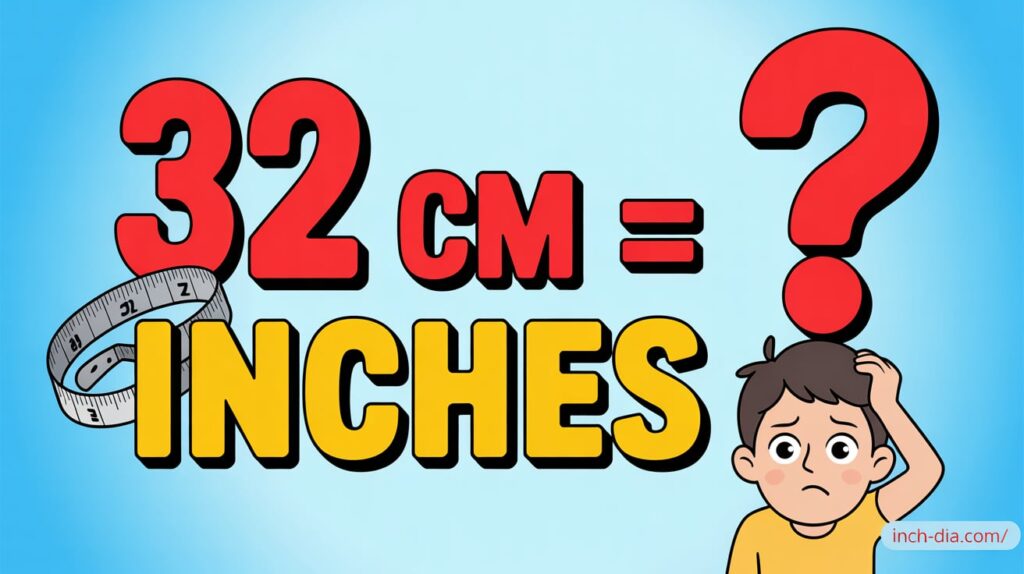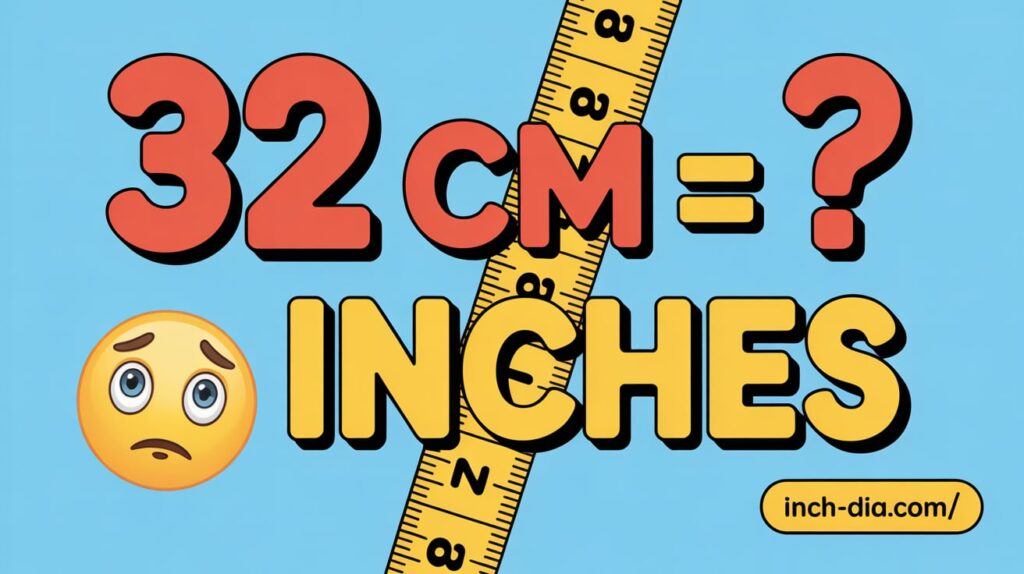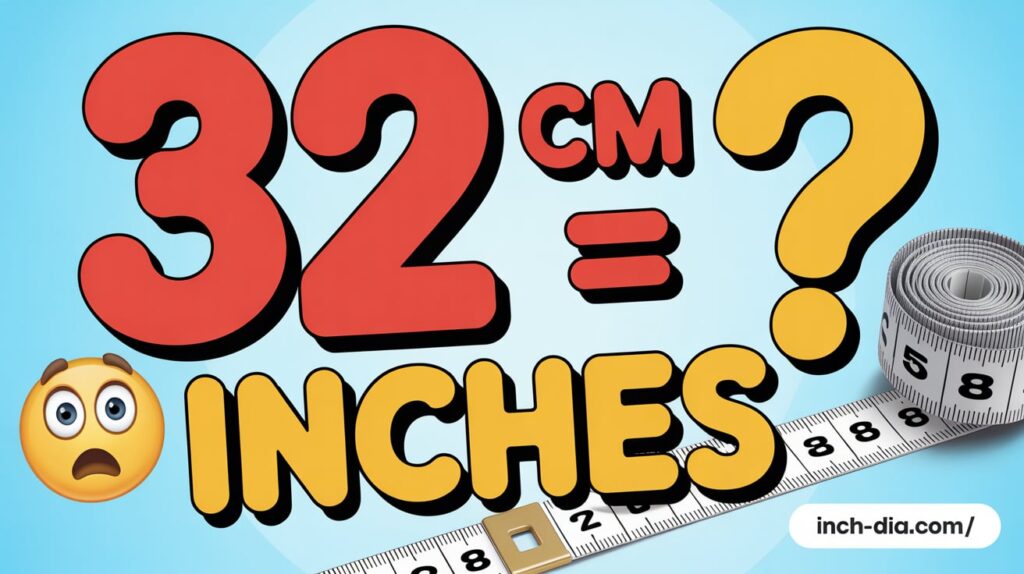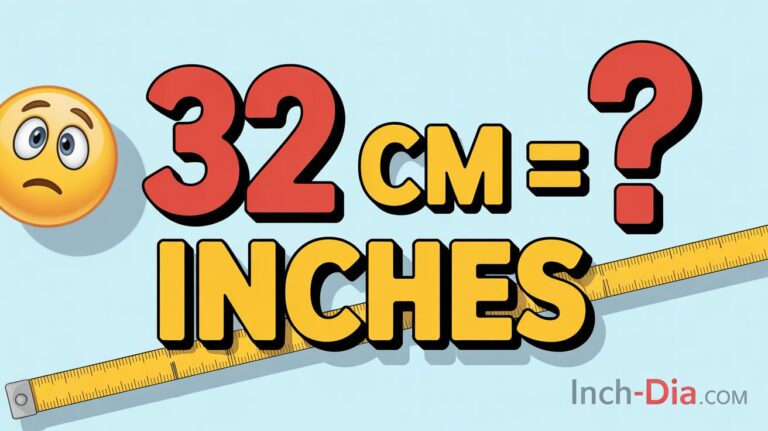In a world where measurements are part of daily life, converting 32 cm to inches can save you time and hassle.
Whether shopping for furniture, working on a DIY project, or tackling a math assignment, understanding how to convert centimeters to inches is a valuable skill.
This guide dives deep into the process of 32 cm to inches conversion, offering a clear measurement conversion guide, practical examples, and practical conversion tips to ensure accurate measurement conversion.
Let’s explore the ins and outs of metric to imperial conversion and help you master length conversion with ease.
Introduction to Measurements: Why Conversions Matter
Measurements are the backbone of countless activities, from building a bookshelf to designing a dress. However, with two dominant systems metric and imperial used worldwide, converting between them is often necessary.
The ability to convert cm to in is especially useful in countries like the United States, where inches are more common, or when dealing with international products labeled in centimeters.
The Importance of Accurate Conversions
An accurate measurement conversion can make or break a project. Imagine ordering a 32 cm picture frame only to realize it’s listed in inches on a U.S. website.
A small mistake in converting 32 centimeters to inches could lead to a frame that doesn’t fit your space. Precision in metric conversion ensures your projects align perfectly, whether you’re a student, hobbyist, or professional.
Metric vs. Imperial Systems: A Quick Overview
The metric system, used globally, is based on units like meters and centimeters, designed for simplicity and scalability.
The imperial system, prevalent in the U.S., uses inches, feet, and yards, rooted in historical standards. Understanding how to navigate both systems is key to mastering centimeters to inches conversions.

Understanding Centimeters and Inches
Before we dive into how to convert 32 cm to inches, let’s break down the basics of these units.
What is a Centimeter?
A centimeter (cm) is a metric unit of length, equal to one-hundredth of a meter. It’s commonly used for everyday measurements, like the length of a book or the height of a child. Its small size makes it ideal for precise measurements in fields like science and design.
What is an Inch?
An inch (in) is an imperial unit of length, equivalent to 2.54 centimeters. It’s widely used in the U.S. for things like screen sizes, clothing measurements, and construction projects.
Knowing the relationship between centimeters and inches is the foundation of easy cm-to-inches conversion.
Why We Need to Convert cm to in
Converting between centimeters and inches is essential when working across systems. For example, a European sewing pattern might list measurements in centimeters, while your U.S.-based sewing machine uses inches. Understanding 32 cm equals how many inches ensures compatibility and accuracy.
The Centimeter to Inch Formula: How It Works
The key to converting 32 centimeters to inches lies in a simple mathematical formula. Let’s explore how it works and apply it step by step.
The Math Behind Metric to Imperial Conversion
The conversion factor between centimeters and inches is well-established: 1 cm equals 0.393701 inches. Alternatively, you can use the fact that 1 inch equals 2.54 cm, so to convert cm to in, you divide the centimeter value by 2.54. Both methods yield the same result, but multiplying by 0.393701 is often easier for quick calculations.
Step-by-Step Guide to 32 cm to Inches Conversion
Here’s how to convert 32 cm to inches:
- Identify the conversion factor: 1 cm = 0.393701 inches.
- Multiply 32 cm by the conversion factor:
- 32 × 0.393701 = 12.598432 inches.
- Round for practical use: For most purposes, 12.598432 inches can be rounded to 12.6 inches.
- Verify the result: To double-check, divide 32 by 2.54:
- 32 ÷ 2.54 = 12.598425 inches, confirming the result.
So, 32 centimeters in inches is approximately 12.6 inches.
Verifying Your Calculation
To ensure accurate measurement conversion, always double-check your math. You can use the alternative method (dividing by 2.54) or compare your result with a centimeter-to-inch calculator. Consistency across methods confirms your calculation is correct.

Practical Applications of Converting 32 Centimeters to Inches
Let’s explore how converting 32 cm to inches applies in real-world scenarios, making the process relatable and useful.
Example 1: Home Decor and Furniture Shopping
Imagine you’re shopping for a wall shelf listed as 32 cm wide on an international website, but your room measurements are in inches.
By performing the 32 cm to inches conversion, you find it’s 12.6 inches wide. This helps you confirm whether the shelf fits your space, avoiding costly returns.
Example 2: Crafting and Sewing Projects
In sewing, precision is critical. If a pattern calls for a 32 cm piece of fabric, but your ruler is marked in inches, converting 32 centimeters to inches (12.6 inches) ensures you cut the right length.
This is especially important for projects like quilts or dresses, where small errors can ruin the final product.
Example 3: Academic and Scientific Use
Students and researchers often encounter measurements in different units. For instance, a science experiment might require a 32 cm length of tubing, but the lab equipment is calibrated in inches.
Knowing that 32 cm equals how many inches (12.6 inches) ensures accurate setups and reliable results.
Tools for Easy cm to Inches Conversion
Several measurement tools for conversions can simplify the process, especially for frequent conversions.
Using a centimeter-to-inch calculator
Online centimeter-to-inch calculators are quick and reliable. Simply input 32 cm, and the tool outputs 12.6 inches.
These calculators are ideal for those who want speed without manual math, though understanding the centimeter-to-inch formula is still valuable for verification.
Physical Tools for Length Conversion
A dual-unit ruler, marked with both centimeters and inches, allows you to measure directly in either unit. For 32 cm to inches conversion, you can visually compare the 32 cm mark to the corresponding inch mark (around 12.6 inches). Other tools, like tape measures, often include both units for convenience.
Apps and Online Resources for Measurement Conversion Guide
Mobile apps like Unit Converter or websites like RapidTables provide instant conversions. These tools are handy for metric to imperial conversion on the go, especially for complex projects requiring multiple measurements.
Common Mistakes in Measurement Conversions and How to Avoid Them
Even simple conversions can go wrong if you’re not careful. Here are common pitfalls and how to avoid them.
Rounding Errors
Rounding too early in calculations can lead to inaccuracies. For example, rounding 0.393701 to 0.4 before multiplying 32 cm can result in 12.8 inches instead of 12.6 inches. Always complete the full calculation before rounding.
Using the Wrong Conversion Factor
Some people mistakenly use an approximate factor, like 0.4 instead of 0.393701, leading to errors. Always use the precise factor (0.393701 or 2.54) for accurate measurement conversion.
Mixing Units in Complex Projects
In projects involving multiple measurements, it’s easy to mix centimeters and inches. Label your measurements clearly (e.g., “32 cm” or “12.6 in”) to avoid confusion during metric conversion.
Practical Conversion Tips for Everyday Use
To make centimeters to inches conversions second nature, try these tips:
Memorizing Key Conversion Factors
Memorize that 1 cm = 0.393701 inches or 1 inch = 2.54 cm. For quick estimates, remember that 10 cm is about 4 inches, so 32 cm is roughly 12–13 inches. This mental shortcut aids in easy cm-to-inch conversion.
Double-Checking Measurements
Always verify your conversions, especially for critical tasks. Use a calculator or cross-check with a centimeter-to-inch calculator to confirm that 32 cm equals how many inches.
Using Conversion Charts
A conversion chart, like the one below, provides a quick reference for common values, saving time and reducing errors.
Conversion Chart for Quick Reference
Here’s a handy chart for centimeters to inches:
Centimeters (cm)Inches (in)
28 cm 11.0236 in
30 cm 11.8110 in
32 cm 12.5984 in
34 cm 13.3858 in
36 cm 14.1732 in
This chart is useful for length conversion tasks beyond just 32 cm to inches.
Advanced Applications of Centimeters to Inches
Converting measurements has far-reaching applications in professional and technical fields.
Engineering and Architecture
Engineers and architects often work with international standards, requiring seamless metric-to-imperial conversion.
For example, a 32 cm component in a blueprint must be converted to 12.6 inches for U.S.-based manufacturing, ensuring compatibility.
International Trade and Manufacturing
Global trade involves products labeled in different units. A 32 cm part from a European supplier must be converted to inches for U.S. markets, ensuring accurate specifications and quality control.
Education and Research
In academic settings, students and researchers frequently convert measurements for experiments or data analysis. Knowing how to convert centimeters to inches ensures consistency across metric and imperial datasets.

FAQs About 32 cm Equals How Many Inches.
What is the Exact Value of 32 Centimeters in Inches?
32 centimeters in inches equals 12.598432 inches or approximately 12.6 inches when rounded to one decimal place.
Are Online Converters Reliable?
Yes, reputable online converters are reliable for easy cm-to-inch conversion but always verify with the centimeter-to-inch formula for critical tasks.
How to Convert Without a Calculator?
For a quick estimate, divide 32 by 2.5 (a close approximation of 2.54) to get roughly 12.8 inches, then adjust slightly for precision. For exact results, use the full factor (2.54).
Conclusion
Learning how to convert 32 cm to inches is a practical skill that bridges the gap between metric and imperial systems.
By understanding the centimeter-to-inch formula, using measurement tools for conversions, and applying practical conversion tips, you can achieve accurate measurement conversion with ease.
Whether you’re decorating, crafting, or working in a professional field, this measurement conversion guide equips you to handle metric to imperial conversion confidently. Keep the conversion chart handy, double-check your calculations, and make length conversion a breeze!

